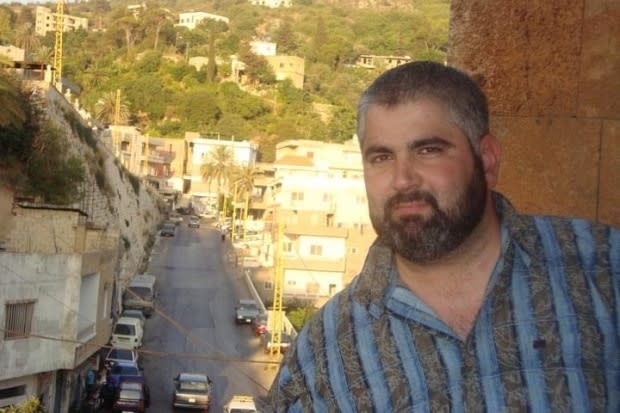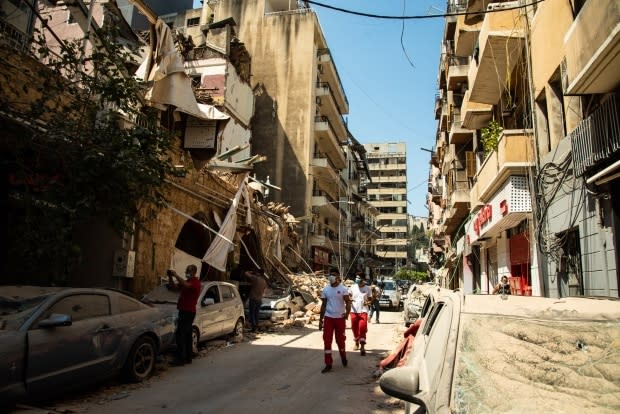Yellowknife Islamic group helps fundraise for Beirut after deadly explosion
Rami Kassem's nephew narrowly avoided the deadly explosion that killed more than 100 people last week, and injured thousands and displaced hundreds of thousands — he was home sick from work that day.
"It was a nightmare for the people over there, and bad dreams and nightmares for me and my family here," said Kassem.
When 2,750 tonnes of ammonium nitrate, warehoused at the capital's port — which has been stored there for six years without safety measures — exploded, it levelled the port and collapsed buildings within a three-kilometre radius.
As soon as he saw the first images, Kassem phoned his loved ones 9,000 kilometres away.
"The first thing you do is to call your family to make sure they are all safe, one by one, my aunts, my uncles, my brothers, my friends."
Kassem, who co-owns the coffee shop Javaroma in Yellowknife, is working with the local Islamic centre to fundraise for Islamic Relief Canada. The group is on the ground providing meals, hygiene kits and health care to people sheltering in schools, mosques and churches.
"You tear when you look at the destruction after they built the country. You feel very bad. You remember those bad days that Lebanon was like this, in the wartime in the 70s and 80s."
All of Kassem's family are safe but their business was damaged in the explosion.
"I have to support my family, but nothing is enough. With this and the harbour closed, we don't know what's going to happen," said Kassem.
"There are people that can't even stay in their homes."
Images of the city in ruin are haunting Kassem, who lived through civil war and was shot near the heart by a sniper in 1985.

Kassem's parents flew from Palestine in 1948 and became refugees in Lebanon. Kassem was born as a refugee there and was "stateless" until he became a Canadian citizen in 2001.
The support flowing into Beirut makes victims of the blast "feel like they are not by themselves in the whole world," he said.
Someone even drove from Hay River to Yellowknife to give Kassem support to send back home, he said.
"Slowly, slowly, people will overcome, so long as Lebanese people feel there is support coming from their own people, from Canadians as well, the Canadian government, it means a lot to them," he said.
"We are human at the end of the day."
Emergency relief
Even before the blast, Lebanon was grappling with hyperinflation, food insecurity, political corruption, and the COVID-19 pandemic.
Hassan Husseini, a Lebanese-Canadian expert in middle eastern politics, said despite widely acknowledged corruption affecting the Lebanese government, Canadians should not be discouraged from donating to relief organizations.
"The need is so great that we need people to continue to find the best and most secure, trustworthy way to get the money [to Beirut]," he said.
Husseini said there are organizations like the Canadian Red Cross and Islamic Relief Canada, which has a strong network in Lebanon.
The Canadian government first offered $5 million in aid, which Husseini said was "grossly inadequate and an insult."

"If you look at what other countries have given so far, Canada's contribution is on the very low end," he said.
Many in the Lebanese and Arab community, and the labour movement pressured Prime Minister Justin Trudeau to give more assistance to Lebanon, he said.
Canada has now committed another $25-million for humanitarian aid.
Husseini said shortages of necessities like food and fuel, most of which are imports, will be made worse by the badly damaged port.
"This is catastrophic for a people who have gone through a terrible economic crisis," Husseini said, adding that involves 30 years of corruption.
Husseini's relatives know one port worker who died, leaving behind three children and a widow. He went to work that day for 5,000 Lebanese pounds — about the equivalent of two Canadian dollars, he said.
Rebuilding a 'very beautiful' city
After the immediate emergency response, donations received by Islamic Relief Canada will go toward long-term rebuilding, according to the group's website
Kassem, in Yellowknife, reminisces about his city when it was rebuilt after.
"Once they built Beirut, it became like a star — very nice, very beautiful, good businesses. Every time I go back home for a visit I walk around the area and it brings you a nice good feeling."
"Are they able to build it again? That's the question right now. I hope it's going to happen, but I'm not sure," Kassem said.


